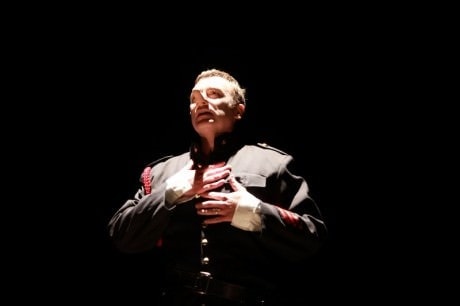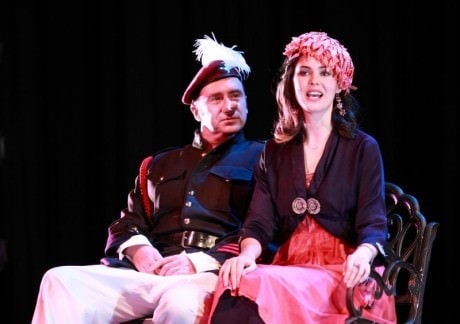At first glance, I took Edmund Rostand’s Cyrano de Bergerac for a comedy about a misbegotten wretch whose every chance for happiness is thwarted by his nose, which looks like a noble erection. I expected to laugh at his plight for a while and then watch the tables turn, click by click, until Cyrano was sitting in the big chair at the table’s head, with the pretty woman in his lap. That’s how comedy should work.

But in the middle of the second act, that wretch exerts a force of will the likes of which I’ve never seen on stage. After that I didn’t laugh at him again.
Here’s what happens: Christian, a handsome inarticulate cadet in Cyrano’s company, decides to make a name for himself by repeatedly mentioning Cyrano’s nose – he’s been told that Cyrano attacks people who use the ‘n’ word in his presence, and he wants to prove he’s not afraid. But Cyrano has just learned that Roxanne, the love of his life, has fallen for this dolt, this damned good-looking dolt, so instead of ripping out the young man’s tongue, Cyrano squeezes himself as hard as he can and turns away. Another nasal insult, and Cyrano rises in rage, then seems to somehow grab the back of his own neck and turn his head away. Then a third insult, and a fourth. This series of provocations pushes Cyrano from anger to rage to regret to humiliation to a sense of brokenness that cannot be repaired, so he embraces it: he puts his arms around Christian and holds him, the beloved of his beloved, for a long time.
I don’t think I could have done that. I would have either hit the guy or run away. And I would bet that in most productions, Cyrano is reduced by that moment to an object of pity at best. But Desiree Sanchez, the director of this production, and Jamie Bower, the actor who plays Cyrano, turn the moment into an epiphany: that misshapen man, I realize, has more inner strength than normal-featured men like me – and not just a little more: enough to make me want to be like him. How they get me to see the struggle through those distinct emotional stages, I don’t know — talent? genius? – but by the end of the second act I’ve stopped expecting the tables to turn in Cyrano’s favor, not in this world. No life that turns out for the best could give a man that kind of strength.
Sanchez is the Artistic Director of Aquila Theatre, an international company founded in London in 1991 with the intention of making classical theater accessible to as many people as possible. Before turning to theater, Sanchez danced for twenty years, which included a stretch as principal dancer for the Metropolitan Opera Ballet. Bower got his theater training in London, and he has performed extensively there and in Australia.
In 1999, the company moved its base of operations to New York, where it produces a regular season of plays at NYU’s Skirball Center for the Performing Arts and coordinates a full slate of educational programs. In keeping with their conviction that “everyone should be afforded the opportunity to engage with classical drama of the highest quality at an affordable price right in their own communities,” Aquila also mounts an annual national tour that includes 60 cities as dissimilar as Asheville, NC and Los Angeles, CA. Last night they brought classical theater to George Mason University’s Center for the Arts in Fairfax, VA.
“A play becomes ‘classical,’” the program notes suggest, “because we recognize that after a time it transcends the original culture it was created for.” Cyrano de Bergerac for example, was written in Paris at the end of the nineteenth century, but like all great theater, “it retains the power to provoke the central question of what it means to be human,” the open central question.
For Cyrano it means integrity. It means making a glorious gesture. It means putting the world into words that make it better than it was, that make it richer than it was, that make it sexier and sweeter, that make it more like the world inside the human heart. It means giving a lesser man the words he needs to win the heart of the woman you love because you know she wants to hear him speak those words. You know she wants him to ravish her with words, you know she wants to tremble when he talks, and you know that she doesn’t tremble. “You’re offering me water when I wanted cream,” Roxanne (played by lovely Caroline O’Hara) complains to the handsome cadet. So you give him the cream, because you know she wants it, and you love her, so you want her to have it, even if it means she kisses him instead of you.
“A kiss is a secret told to the mouth instead of the ear,” says Cryano.
The secret he would like to whisper into Roxanne’s mouth must be unbearably close to the open central question. When she asks him whether he wrote all the words that made her fall in love with Christian, when she tells him she would love the man who wrote those words no matter what he looks like, when she tells him she believes he wrote those words, he says she’s wrong. When it’s finally possible for him to have what he has yearned for all his life, in other words, he lets it go.Why he does that I can’t say, but when he does it, the stage he occupies looks like the world I live in, and his nose looks just like mine.

Running time: Two and a half hours, with one intermission.
Meet the cast of Cyrano de Bergerac.
Aquila Theatre’s Cyrano de Bergerac played one night only on January 18, 2013 at George Mason University’s Center for the Arts – 4373 Mason Pond Drive, in Fairfax, VA. Here is a calendar of future events at Center for the Arts. For information on Cyrano’s tour stops, check the Aquila Theater website.




